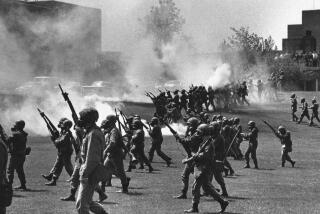TURMOIL IN CHINA: Crackdown on Dissent : Dreams Crushed, One-Time Firebrands of Tian An Men Are on the Run
- Share via
BEIJING — They were cocky and restless, full of explosive ideals and recklessness. They thought they would move their world. Now they are fugitives.
For a few heady weeks, student leaders from major universities in Beijing and other cities occupied the symbolic heart of Beijing and the minds of supporters on Tian An Men Square and opponents behind the walls of Zhongnanhai, China’s Kremlin.
The weapons in their battle for democratic reform have all but disappeared: No more bullhorns, leaflets or banners carry their message to young followers, a restive public and a foreign audience that marveled at their brashness.
Eleven days ago, their images appeared on television at the head of massive crowds of students and common citizens facing down police and soldiers alike. Once, a group of them appeared on the screen jousting verbally with Premier Li Peng, the hard-line Communist leader who promoted a crackdown on the Tian An Men demonstrators.
Beginning this week, 21 of their faces appeared on a video version of wanted posters that gave their names, ages, descriptions and even regional accents to make it easier for anyone so inclined to inform on them. The Chinese government identified the 21 as ringleaders in a “counterrevolutionary rebellion.”
On Wednesday, less than 24 hours after the order had gone out for their apprehension, state-run television said that two of the 21 had been captured. One, engineering student Zhou Fengsuo, was turned in by his own sister and her husband in the central city of Xian, the television said.
The other arrest was of law student Xiong Yan, one of those who had been seen on television arguing with Premier Li.
The fate of the 19 others is not yet known. Classmates of some of them at Beijing campuses say they have gone into hiding. China’s huge size works in their favor: There are a lot of places to escape to. But the size and relentless pursuit of the country’s well-practiced police apparatus works against them: There are a lot of prying eyes in China.
Looking back, it is hard to imagine that the students seemed to feel immune from punishment, that somehow China’s traditional reverence for the scholar could shield them from a fate that has befallen so many dissident predecessors this century.
Among the 19 still at large, three stand out for their visibility and involvement.
Perhaps none was more flamboyant than Wuer Kaixi, a student of education administration at Beijing University. The government has singled out Wuer for special attack. State television showed him eating at a restaurant, which the announcer viewed as a sign of corruption.
The video is a tribute to the state’s pettiness and to the resources it is willing to deploy to show Wuer in a bad light.
During the weeks of protest at Tian An Men, Wuer worked up the crowd with sharp rhetoric and an apparent fearlessness. In a typical speech, he exhorted students: “Tomorrow, we will create history. Students, let us march together with our heads held high.”
Carried on the backs of fellow protesters and holding aloft a red school banner, he led a charge against a group of waiting police.
Like many of his colleagues, Wuer, 21, is the offspring of China’s bureaucratic elite. His father was a Communist Party member and government translator, and Wuer himself aspired to join the party.
In a fateful twist, Wuer advised his fellow students to give up the demonstration in Tian An Men Square on May 22, nearly two weeks before the June 3-4 military assault on the demonstrators in and around the square. For his caution, he was voted out of the leadership of the Independent Assn. of Beijing Universities, an amalgam of student groups collected in the plaza.
He was replaced by Chai Ling, a fiery woman from Beijing Teachers University, who became leader of the ad hoc Command for the Protection of Tian An Men.
Chai, 23, had helped to organize hunger strikes and to urge the students on when it appeared that their numbers were faltering. When she was sworn in as a leader of the command, she vowed: “I will risk my life and invest my wholehearted loyalty to protect Tian An Men Square, to protect our capital Beijing and to protect the People’s Republic.”
Seven days later, Chai, too, would counsel students to leave the square. Inflamed with confidence, they refused. Chai dropped out, citing ill health.
Another top leader, history student Wang Dan, also favored ending the Tian An Men demonstration. The slender, bespectacled 24-year-old placed his activism in the perspective of Chinese intellectual history, in which it is considered the responsibility of the educated elite to criticize the government.
There are contradictory rumors about his fate: Some say he was killed in the assault on Tian An Men, while others say he is alive and in hiding.
More to Read
Sign up for Essential California
The most important California stories and recommendations in your inbox every morning.
You may occasionally receive promotional content from the Los Angeles Times.













